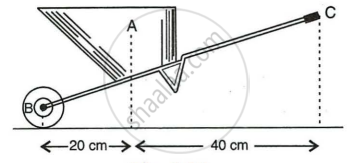Advertisements
Advertisements
Question
In class II lever, effort arm is ______ than the load arm.
Solution
In class II lever, effort arm is longer than the load arm.
APPEARS IN
RELATED QUESTIONS
Explain the term mechanical advantage.
Define the term velocity ratio.
Define the term efficiency of a machine.
When does a machine act as (a) a force multiplier, (b) a speed multiplier? Can a machine act as a force multiplier and a speed multiplier simultaneously?
- State the relationship between mechanical advantage, velocity ratio and efficiency.
- Name the term that will not change for a machine of a given design.
How is the mechanical advantage related with the velocity ratio for an actual machine? State whether the efficiency of such a machine is equal to 1, less than 1 or more than 1.
Draw a diagram to illustrate the position of fulcrum load and effort, in the following:
A common balance
Draw a diagram to illustrate the position of fulcrum load and effort, in the following:
A nut cracker
Figure below shows a wheel barrow of mass 15 kgf carrying a load of 30 kgf with its centre of gravity at A. The points B and C are the centre of wheel and tip of the handle such that the horizontal distance AB = 20 cm and AC = 40 cm.

Find:
- the load arm,
- the effort arm,
- the mechanical advantage and
- the minimum effort required to keep the leg just off the ground.
A machine works as a
- force multiplier,
- speed multiplier.
In each case, state whether the velocity ratio is more than or less than 1.
